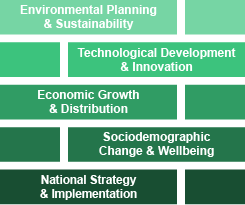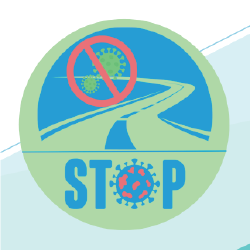
|
||||||||||||||||||||||||||||||||||||||||||||||||||||||||||||||||||||||||
| Research | ||||||||
Strategic Research Clusters
 Policy Research @ HKIAPS has identified five closely linked interdisciplinary research clusters to promote academic excellence and social contribution.
Policy Research @ HKIAPS has identified five closely linked interdisciplinary research clusters to promote academic excellence and social contribution.
In the initial phase, we are focusing on research strengths within the Chinese University and on aligning them with the government’s policy priorities and regional development strategies, particularly with the Belt and Road Initiative and the Guangdong-Hong Kong-Macao Greater Bay Area development plan. We will further identify global strategies that are relevant to Hong Kong. ■ |
||||||||
Research Projects * Policy Research @ HKIAPS member
|
||||||||
On Belt and Road Initiative and Greater Bay Area  The Impact of Sino-US Disputes on the Economy of the Guangdong-Hong Kong-Macao Greater Bay Area
The Impact of Sino-US Disputes on the Economy of the Guangdong-Hong Kong-Macao Greater Bay Area by Hongling Guan (PI), & Yun-wing Sung* |
||||||||
On Economic  Hong Kong as International Financial Centre: Challenges and Opportunities
Hong Kong as International Financial Centre: Challenges and Opportunities by Hongling Guan (PI), Yun-wing Sung*, & Terence T. L. Chong |
||||||||
On Health  Personalised Health Coaching for Family Caregivers
Personalised Health Coaching for Family Caregivers by Helen Chan*, Benny Zee, Sally Lo, & Fiona Tang |
||||||||
 Assessing and Health Coaching for Cardiometabolic Risk in Middle-Aged Group
Assessing and Health Coaching for Cardiometabolic Risk in Middle-Aged Group by Helen Chan*, Benny Zee, Sally Lo, & Fiona Tang |
||||||||
 On the Road to Combat the Pandemic: Hong Kong Citizens’ Views on the Impact of and Responses to COVID-19
On the Road to Combat the Pandemic: Hong Kong Citizens’ Views on the Impact of and Responses to COVID-19 by Victor Zheng*, Hua Guo*, & Fanny M. Cheung* |
||||||||
 Implementation of a Family-based Multimedia Educational Programme to Promote the Utilisation of Colorectal Cancer Screening by Older South Asian Ethnic Minorities in Hong Kong
Implementation of a Family-based Multimedia Educational Programme to Promote the Utilisation of Colorectal Cancer Screening by Older South Asian Ethnic Minorities in Hong Kong by Winnie K. W. So* (PI), Dorothy N. S. Chan, Kai-chow Choi, & Carmen W. H. Chan |
||||||||
On Belt and Road Initiative and Greater Bay Area
The Impact of Sino-US Disputes on the Economy of the Guangdong-Hong Kong-Macao Greater Bay Area Investigators: Hongling Guan (PI), & Yun-wing Sung* Funding source: Sun Yat-sen University, China  The research team from Sun Yat-Sen University visited Hong Kong from 3 June to 6 June 2019. Two research reports were completed. One of them on the impact of the Hong Kong National Security Law on Hong Kong’s economy received attention from relevant central authorities. The impact of trade disputes on industrial restructuring will be studies in the next phase.
The research team from Sun Yat-Sen University visited Hong Kong from 3 June to 6 June 2019. Two research reports were completed. One of them on the impact of the Hong Kong National Security Law on Hong Kong’s economy received attention from relevant central authorities. The impact of trade disputes on industrial restructuring will be studies in the next phase.
|
||||||||
On Economic
Hong Kong as International Financial Centre: Challenges and Opportunities Investigators: Hongling Guan (PI), Yun-wing Sung*, & Terence T. L. Chong Funding source: Institute of Guangdong, Hong Kong and Macao Development Studies, Sun Yat-sen University, China  The Project covers the longitudinal development of Hong Kong as an IFC (International Financial Centre), and the horizontal comparison of Hong Kong with other major IFC’s in terms of various indicators. The strengths and weaknesses of the major subsectors (stock market, bond market, wealth management, and professional services) are then examined. External challenges (US-China rivalry, Ukrainian war and contractionary monetary policy to fight inflation, Covid epidemic), internal challenges (emigration of talents, exodus of multinationals, and systemic risks), and opportunities (digital currency, fintech, Belt and Road initiative) are analysed in detail.
The Project covers the longitudinal development of Hong Kong as an IFC (International Financial Centre), and the horizontal comparison of Hong Kong with other major IFC’s in terms of various indicators. The strengths and weaknesses of the major subsectors (stock market, bond market, wealth management, and professional services) are then examined. External challenges (US-China rivalry, Ukrainian war and contractionary monetary policy to fight inflation, Covid epidemic), internal challenges (emigration of talents, exodus of multinationals, and systemic risks), and opportunities (digital currency, fintech, Belt and Road initiative) are analysed in detail.
|
||||||||
On Education
Survey on Student Withdrawal from School and Teacher Turnover Investigator: Esther S. C. Ho* Funding source: The Hong Kong Association of the Heads of Secondary Schools Limited  The “Survey on Student Withdrawal from School and Teacher Turnover” is a collaborative research study by the Hong Kong Association of the Heads of Secondary Schools Limited (HKAHSS) and the Hong Kong Centre for International Student Assessment (HKCISA). It aims to:
The “Survey on Student Withdrawal from School and Teacher Turnover” is a collaborative research study by the Hong Kong Association of the Heads of Secondary Schools Limited (HKAHSS) and the Hong Kong Centre for International Student Assessment (HKCISA). It aims to:
|
||||||||
On Health
Personalised Health Coaching for Family Caregivers Investigators: Helen Chan* (PI), Benny Zee, Sally Lo, & Fiona Chan Funding source: Private Donation  The goal of this project is to promote wellbeing among family caregivers through primary prevention strategy. The objectives are to identify the cardio-metabolic risk and mental wellbeing of 1,000 family caregivers and to motivate those with identified risk for lifestyle modification and behavioural change through personalised health coaching. This project intends to shift the healthcare focus from cure- to prevention-oriented. This project will help to heighten the community awareness towards cardio-metabolic risks and preventive strategies.
The goal of this project is to promote wellbeing among family caregivers through primary prevention strategy. The objectives are to identify the cardio-metabolic risk and mental wellbeing of 1,000 family caregivers and to motivate those with identified risk for lifestyle modification and behavioural change through personalised health coaching. This project intends to shift the healthcare focus from cure- to prevention-oriented. This project will help to heighten the community awareness towards cardio-metabolic risks and preventive strategies.
|
||||||||
Assessing and Health Coaching for Cardiometabolic Risk in Middle-Aged Group Investigators: Helen Chan* (PI), Benny Zee, Sally Lo, & Fiona Chan Funding source: Knowledge Transfer Project Fund, The Chinese University of Hong Kong  The overall aim of this project is to raise public awareness towards cardiometabolic risk factors in middle adulthood. In this project, people with cardiometabolic risk will be motivated to behavioural change through a personalised health coaching intervention. The project experiences will shed light on the local development of primary healthcare policy and services.
The overall aim of this project is to raise public awareness towards cardiometabolic risk factors in middle adulthood. In this project, people with cardiometabolic risk will be motivated to behavioural change through a personalised health coaching intervention. The project experiences will shed light on the local development of primary healthcare policy and services.
|
||||||||
On the Road to Combat the Pandemic: Hong Kong Citizens’ Views on the Impact of and Responses to COVID-19 Investigators: Victor Zheng*, Hua Guo*, & Fanny M. Cheung* Funding source: Policy Research @ HKIAPS  It has been one-and-a-half years since the first case of coronavirus infection was confirmed in Hong Kong in January 2020. There were four waves of outbreak during this period. Although hundreds of infected cases appeared daily at the peak of the third and fourth waves, the epidemic was eventually brought under control. Nonetheless, there is still a risk from imported cases, although the pandemic is less intense than before. At this important moment, it is necessary to conduct comprehensive research to analyse opinion polls and understand the attitudes of citizens towards various disease prevention measures and arrangements implemented by the government.
It has been one-and-a-half years since the first case of coronavirus infection was confirmed in Hong Kong in January 2020. There were four waves of outbreak during this period. Although hundreds of infected cases appeared daily at the peak of the third and fourth waves, the epidemic was eventually brought under control. Nonetheless, there is still a risk from imported cases, although the pandemic is less intense than before. At this important moment, it is necessary to conduct comprehensive research to analyse opinion polls and understand the attitudes of citizens towards various disease prevention measures and arrangements implemented by the government.
Since the start of the pandemic, studies have been conducted from different perspectives to determine how to combat the pandemic, for example, from the perspective of public health, technology, or medicine. However, studies are lacking on how to understand the emergency responses of people in this COVID-19 war. This research is based on data from long-term opinion polls. It includes an in-depth analysis of the COVID-19 pandemic from different aspects in Hong Kong. Directional policy recommendations are also provided to related policymakers and organizations. The research team discovered that citizens demonstrated active and stable responses to the pandemic, but that their vigilance in applying disease protection measures would become less intense as the pandemic eases. Also, individuals hold different views and stances towards the various disease prevention measures and arrangements implemented by the government. However, opinions are more varied on the policies or measures that impose more restrictions on personal freedoms, and these disagreements are also magnified among those in certain age groups and of certain political orientations. In addition, citizens hold an overall negative view of the government’s emergency response to the pandemic. The view on economic prospects and household income is pessimistic as well, more so among those in the non-establishment camp than in the establishment camp. Drawing on the research findings, the research team proposed directional policy recommendations. First, science should take the lead in disease prevention. The government should be sensitive in handling political factors and needs to be aware of the negative impact of announcing new emergency response measures. Second, the impact of the pandemic on different groups may differ. To resuscitate the economy, emergency response measures should focus on those groups that were the most affected by the pandemic. Lastly, promoting the value of “taking the big picture into consideration” and encouraging people to actively take protective measures could lead to more long-term and comprehensive results than hardline measures. These policy recommendations could help the government to understand public opinion and allow them to take it into consideration when implementing disease prevention policies in the future.
|
||||||||
Implementation of A Family-based Multimedia Educational Programme to Promote the Utilisation of Colorectal Cancer Screening By Older South Asian Ethnic Minorities in Hong Kong Investigators: Winnie K. W. So* (PI), Dorothy N. S. Chan, Kai-chow Choi, & Carmen W. H. Chan Funding source: Health Care and Promotion Scheme, Food and Health Bureau, HKSAR Government  Colorectal cancer (CRC) is currently the most prevalent type of cancer in Hong Kong. As CRC screening is recognised as an effective strategy for CRC prevention, its universal utilisation by residents of Hong Kong is crucial for reducing the prevalence of CRC in Hong Kong. Previous studies have reported that South Asian ethnic minorities do not tend to utilise cancer screening services, as they face multiple barriers to do so, such as language barriers, and a limited awareness of the need to undergo regular screening and how to access screening services. Older individuals in this population are more prone to face these barriers, as they are less able to comprehend the health information disseminated by the Hong Kong government. These individuals therefore require linguistically appropriate health educational programmes that increase their knowledge of CRC prevention and screening.
Colorectal cancer (CRC) is currently the most prevalent type of cancer in Hong Kong. As CRC screening is recognised as an effective strategy for CRC prevention, its universal utilisation by residents of Hong Kong is crucial for reducing the prevalence of CRC in Hong Kong. Previous studies have reported that South Asian ethnic minorities do not tend to utilise cancer screening services, as they face multiple barriers to do so, such as language barriers, and a limited awareness of the need to undergo regular screening and how to access screening services. Older individuals in this population are more prone to face these barriers, as they are less able to comprehend the health information disseminated by the Hong Kong government. These individuals therefore require linguistically appropriate health educational programmes that increase their knowledge of CRC prevention and screening.
The aim of this project was to implement a family-based multimedia educational programme that increases the awareness of the importance of CRC screening and promotes the utilisation of CRC screening by South Asian older adults. We recruited South Asian older adults and one of their younger family members to the programme, which was delivered to participants by trained instructors at centres with which we have established collaborations and are operated by non-governmental organisations (NGOs) serving South Asians in the local community. We found that the programme considerably enhanced CRC screening utilisation by older adults, and that a significant proportion of them were able to submit their stool samples for screening on their own, rather than relying on assistance from their younger family members. These observations indicate that the programme effectively increased both the willingness of the older adults to undergo CRC screening and their self-efficacy at submitting their samples for screening. Our findings indicate that our family-based multimedia programme could effectively promote CRC screening utilisation to South Asian ethnic minorities throughout Hong Kong, and to increase their knowledge of CRC prevention and screening. We recommend that the Hong Kong government allocates further resources to enable the implementation of this family-based programme at all NGOs serving South Asians in Hong Kong, to enable this programme to be integrated as part of the support services provided by these NGOs. For example, the government may consider providing funding for the employment and training of programme instructors, to increase the competence and knowledge of these instructors in the delivery of the programme to their community peers. The building of such partnerships with these NGOs may be the key to enhancing the reach of the educational programme to local South Asian communities and the sustainability of its implementation, enabling more South Asians to become aware of the importance of CRC screening and be willing to voluntarily undergo screening. Ultimately, this could reduce both the prevalence of CRC in this underserved population and associated burdens on the health system. |
||||||||


